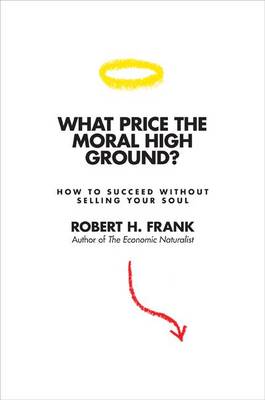Many observers interpret the recent wave of corporate scandals as support for the cynical view that self-interest trumps concerns for the greater good. Indeed, this interpretation finds comfort in the intellectual traditions of fields from mainstream economics to evolutionary biology. But is it valid? In "What Price the Moral High Ground?", economist and social critic Robert Frank challenges the notion that doing well is accomplished only at the expense of doing good. Frank explores exciting new work in economics, psychology, and biology to argue that honest individuals often succeed, even in highly competitive environments, because their commitment to principle makes them more attractive as trading partners. Drawing on research he has conducted and published over the past decade, Frank challenges the familiar homo economicus stereotype by describing how people create bonds that sustain cooperation in one-shot prisoner's dilemmas.
He goes on to describe how people often choose modestly paid positions in the public and nonprofit sectors over comparable, higher-paying jobs in the for-profit sector; how studying economics appears to inhibit cooperation; how social norms often deter opportunistic behavior; how a given charitable organization manages to appeal to donors with seemingly incompatible motives; how concerns about status and fairness affect salaries in organizations; and how socially responsible firms often prosper despite the higher costs associated with their business practices. Frank's arguments have important implications for the conduct of leaders in private as well as public life. For, as he concludes, the better we understand personal motivation in competitive environments, the better we can structure organizations and public policies to promote our true ends.
- ISBN10 0691006725
- ISBN13 9780691006727
- Publish Date 22 December 2003
- Publish Status Out of Print
- Out of Print 23 July 2013
- Publish Country US
- Imprint Princeton University Press
- Format Hardcover
- Pages 224
- Language English
- URL https://press.princeton.edu/titles/7602.html
